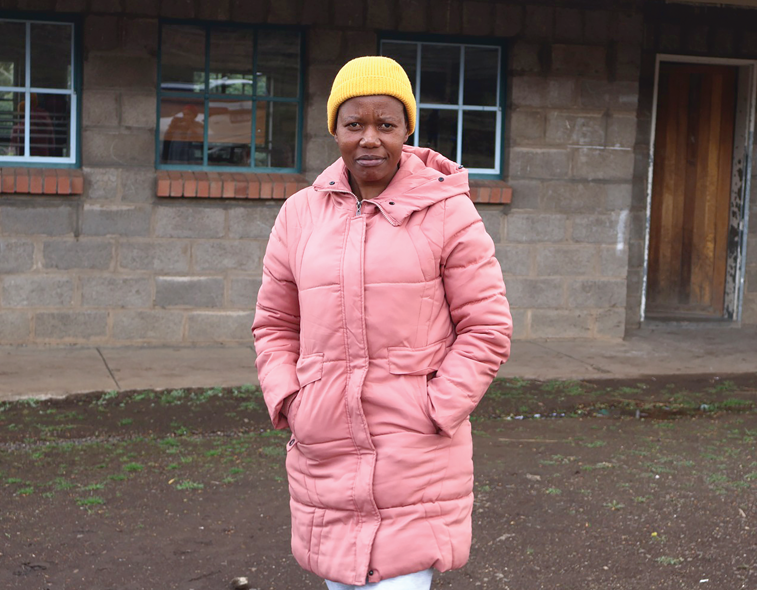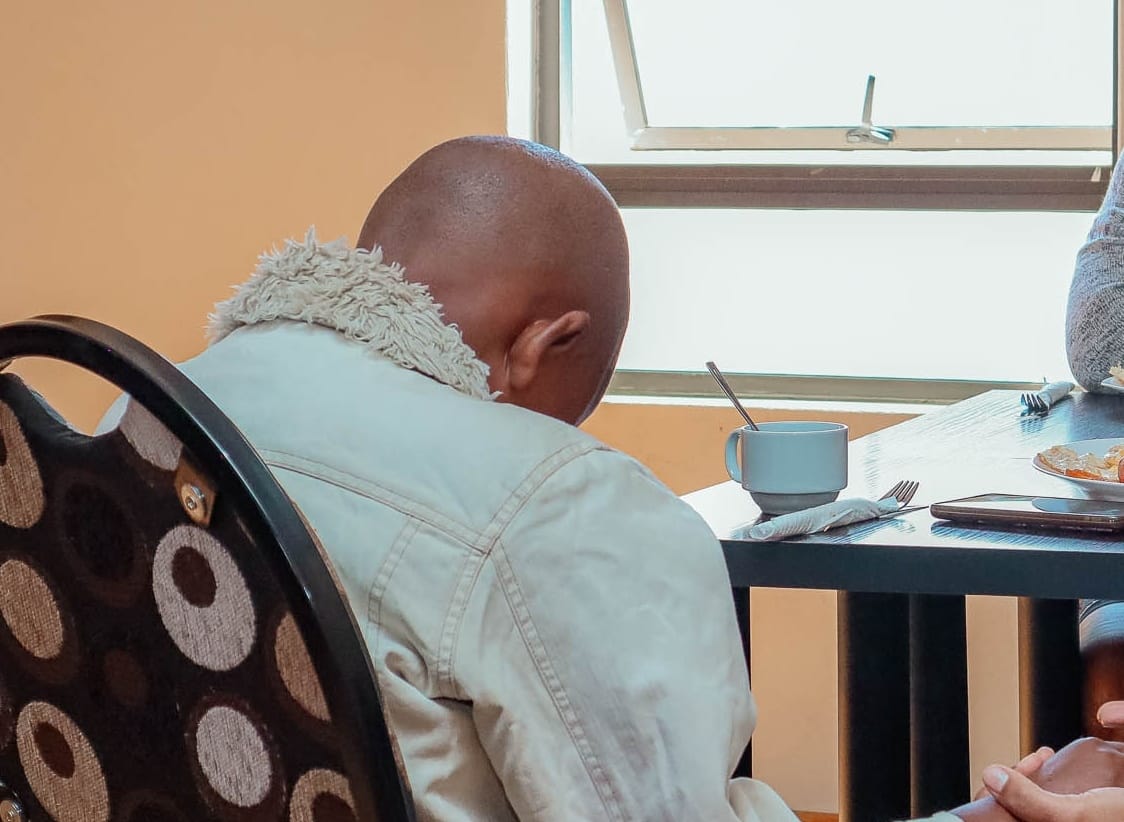When payday comes, most teachers think about groceries, rent, or transport money. But for ’Matumisang Mafitoe, a teacher at Bokong Community High School, her thoughts go first to her girls, the ones who might miss class this month because they cannot afford sanitary pads.
Mafitoe’s mission is to end the cycle of missed education caused by period poverty.
Her initiative was born out of a stark realisation. An increasing number of girls became absent from school, and the reason was always the same. “I would find out from other students that a certain student did not come to school because they are on their periods and do not have pads. This broke me,” she recalled.
Initially, she started by offering pads from her personal supply. However, the need quickly outgrew her own stock.
“I realised the numbers were increasing and that’s when I realised that I have to have pads meant for school girls every month,” she said.
She understands that even a few days of absence can have a cascading effect, leading to a student being left behind, struggling with their studies, and eventually performing poorly.
While she has reported this critical issue to the principal, who occasionally assists with buying pads from the school’s budget, the financial struggles of the school mean that this vital initiative is now primarily funded from Mafitoe’s own pocket.
Her commitment remains unwavering, driven by an empathy that was deeply cemented by a pivotal, heartbreaking incident.
She vividly remembers the moment when one schoolgirl, caught off-guard by the start of her period, did not have any pads at school. “I noticed her because of a huge blood stain on her uniform,” Mafitoe explained.
She immediately and discreetly called the girl over, gave her pads, and instructed her to use her jersey to cover herself before sending her home to clean up and change.
“That was the most heartbreaking incident for me,” she shared, making the fight against period poverty personal.
Mafitoe’s commitment stems from her deep understanding of the far-reaching consequences of period poverty, which extend well beyond a few missed days of school.
She warned that this lack of access to sanitary products not only causes girls to miss school but also results in them dropping out altogether. The shame and anxiety associated with menstruation without proper protection severely affect their self-esteem.
Perhaps most tragically, Mafitoe noted that the desperation for essential sanitary products can push girls into having affairs with older men, a transactional relationship where the men provide for them, often leading to early and unintended pregnancies.
It is a vicious cycle of poverty and vulnerability that stunts a young woman’s potential before it even has a chance to blossom.
Before she started her personal project, Mafitoe counted the cost of this crisis every week, at least three girls would miss school because they were on their period and did not have sanitary pads.
Today, her efforts have completely reversed that trend. “Now, not even a single learner misses school because they did not have pads, it may be because of other reasons,” she announced with palpable relief.
The impact is immediately visible in the school environment. Principal ‘Manthatisi Jobere is a firm believer in Mafitoe’s work.
“Girls are more focused, less anxious, and more confident,” the principal says. “What Mafitoe has done may seem ‘small’ to some people, but to these students, it has made a world of difference.” This renewed confidence and stability translate directly into improved attendance and better academic performance.
Bokong Community High School is not an isolated case, the challenge of period poverty is a national crisis that requires systemic solutions.
Recognising this, the nation has seen the rise of powerful initiatives dedicated to addressing the problem at scale.
Among these is the Hlokomela Banana initiative, spearheaded by Her Majesty Queen ‘Masenate Mohato Seeiso. Launched in 2017, the program is committed to a massive undertaking, providing sanitary products to all female secondary and high school learners in Lesotho.
The necessity of such comprehensive initiatives is underscored by sobering statistics. Mpeake Sekhibane, the Project Manager for Hlokomela Banana, reported that an estimated 1,400 girls dropped out of school across the country in 2023 alone.
He attributed these dropouts to a combination of factors, including period poverty, early marriages, pregnancies, and the financial constraints of parents unable to pay school fees.
The global community has also stepped in to stress the urgency of the matter. The UNFPA emphasises a guiding principle: “Menstruation should never be the reason a girl is left behind.” The agency promotes a holistic approach that includes not only access to menstrual products but also proper hygiene facilities in schools, education to normalise menstruation, and policies that dismantle harmful stigma.
In a major step toward a long-term, national solution, the UNFPA, in partnership with the Ministry of Gender, Youth and Social Development, recently convened a five-day workshop on menstrual health and hygiene.
This gathering brought together government representatives, civil society organizations, and local groups to validate sustainable, cost-effective, and community-driven models for the universal distribution of sanitary pads in Lesotho.
The workshop was part of UNFPA’s ongoing commitment to supporting the Government of Lesotho in tackling Menstrual Health and Hygiene (MHH) challenges, including period poverty.
During the collaborative sessions, stakeholders meticulously reviewed proposed supply chain models for pad distribution, considering both school-based and community-level mechanisms.
They also worked on developing educational messages and a robust monitoring and evaluation framework to ensure the program’s long-term impact is sustained and measurable.
The foundation for these large-scale interventions was a thorough study. The 2022 Menstrual Health and Hygiene (MHH) Situational Analysis for Lesotho, conducted by the Ministry of Health with UNFPA support, was instrumental in diagnosing the key challenges.
It confirmed that limited access to sanitary products, fear of soiling, misconceptions about menstruation, and menstrual pain were the primary culprits leading to high school absenteeism among girls.
Based on this comprehensive analysis, the government has made a strategic decision to pilot universal MHH delivery models. This two-year pilot program, starting in the Maseru and Mokhotlong districts, is specifically targeting girls and young women between the ages of 10 and 24.
While these large-scale government and NGO initiatives are critical for national change, the immediate, tangible impact is felt in schools like Bokong Community High School, where the personal sacrifice of a dedicated teacher ensures that no girl has to choose between her education and her dignity.
Mafitoe’s daily act of kindness is a powerful testament to the difference one committed individual can make in ensuring the future remains open for every young woman.
Summary
- While she has reported this critical issue to the principal, who occasionally assists with buying pads from the school’s budget, the financial struggles of the school mean that this vital initiative is now primarily funded from Mafitoe’s own pocket.
- It is a vicious cycle of poverty and vulnerability that stunts a young woman’s potential before it even has a chance to blossom.
- Before she started her personal project, Mafitoe counted the cost of this crisis every week, at least three girls would miss school because they were on their period and did not have sanitary pads.

Ntsoaki Motaung is an award-winning health journalist from Lesotho, specializing in community health stories with a focus on sexual and reproductive health and rights, as well as HIV. She has contributed to platforms like “Be in the KNOW,” highlighting issues such as the exclusion of people with disabilities from HIV prevention efforts in Lesotho.
In addition to her journalism, Ntsoaki serves as the Country Coordinator for the Regional Media Action Plan Support Network (REMAPSEN). She is also a 2023 CPHIA Journalism Fellow.








